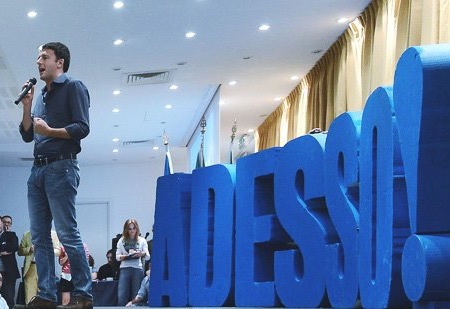Many have led Italy’s long-fractuous center-left over the past two decades, but none have succeeded in building a durable coalition that can win an election and govern for a whole parliament.![]()
Achille Occhetto, the leader of the Partito Comunista Italiano, Italy’s then-Communist Party, failed miserably in the 1994 elections against Silvio Berlusconi. Francesco Rutelli, the former mayor of Rome throughout much of the 1990s, led the center-left L’Ulivo ‘Olive Tree’ coalition to defeat in 2001, and his successor, Walter Veltroni led the newly-formed Partito Democratico (PD, Democratic Party) to defeat in 2008. The only successful leftist has been the plodding Romano Prodi, who barely won the 1996 and 2006 elections, only to watch his coalitions, after both elections, crumble within a year or two. And that’s not even counting the pretenders, such as Massimo D’Alema, who succeeded Prodi as prime minister from 1998 to 2000 and who served as foreign minister from 2006 to 2008.
With Berlusconi now (mostly) in the sidelines as the upcoming general election approaches, the Italian left is hoping to change that, and the first step will be November 25’s primary election to determine who will lead Italy’s broad left into the general elections, which will be held on or before April 13. In addition to the PD, the more radical left Sinistra Ecologia Libertà (SEL, Left Ecology Freedom) of Puglia’s regional president Nicchi Vendola, the minor Partito Socialista Italiano (PSI, Italian Socialist Party), the centrist Alleanza per l’Italia (ApI, Alliance for Italy) launched by Rutelli in 2009 and the perennial anti-corruption party Italia dei Valori (IdV, Italy of Values) led by former prosecutor Antonio di Pietro.
The current PD leader, Pier Luigi Bersani (pictured above, top), follows in the long line of steady, if boring and uninspired center-left politicians in Italy. He served as the regional president of the traditional leftist stronghold of Emilia-Romagna in central Italy from 1993 to 1996, as a minister in the Prodi and D’Alema cabinets in the late 1990s and most recently, as the minister of economic development in Prodi’s second government from 2006 to 2008. As economic development minister, he worked to bring about reforms to liberalize Italy’s labor market and its economy. But at age 61, Bersani nearly personifies the staid tradition of the Italian left, and he would likely be a prime minister in the Prodi tradition — solidly leftist, but more of the social democratic variety than the socialist. He has the support of most of the center-left establishment, including that of D’Alema.
His main rival, however, is hoping to end that trend — Matteo Renzi (pictured above, bottom) is the 37-year old mayor of Florence, the largest city in the central region of Tuscany. Renzi, who served as president of the province of Florence from 2004 to 2009 before his election as mayor, has called on all of the current politicians on the left and the right to step aside to make way for a new generation of leadership — presumably his.
Despite Renzi’s considerably more populist approach to the primaries and to Italian politics, evocative of times of the ‘third-way’ style of former UK prime minister Tony Blair, both Bersani and Renzi would posture more to the center in the general election.
In addition to Bersani and Renzi, Vendola, who was served as Puglia’s leftist — and openly gay — regional president since 2005, is also running, to the strident left of both Bersani and Renzi. Bruno Tabacci of the ApI, a former regional president of Lombardy, and Laura Puppato of the PD, a regional councillor in Veneto, are also running.
Continue reading Bersani and Renzi offer two distinct personalities for Italy’s center-left


